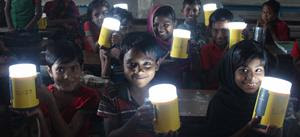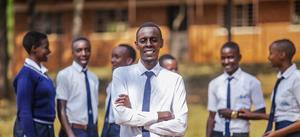Your Excellency Madam President, Ambassador Keva Bain,
Your Excellency Alain Berset, Federal Counsellor of Switzerland,
Excellencies, distinguished colleagues and friends,
Lucy Nyambura is a health promotion officer in Mombasa City, Kenya.
When COVID-19 arrived last year, a strict lockdown was introduced, but it was met with strong resistance by the local community, who refused to be tested, isolated or treated.
As she made her daily rounds, providing information about the dangers of the new virus, Lucy was insulted in the streets and she and her team sometimes had to stop working for their own safety.
But Lucy kept going back to the community. After weeks of engaging leaders, things started to change. Communities started following COVID-19 guidelines and accepted to be tested. The spread of the virus was curtailed and the lockdown was removed.
Asante sana, Lucy.
Dr Gantsengel Purev is an intensive care specialist at the Central Military Hospital in Ulanbataar, Mongolia.
This is what he said:
“During my first shift, I lost my grandmother to COVID-19. She died in my arms. During my last shift, three people died in an hour. My patients are no different to my grandmother and grandfather. Many patients recover and leave the hospital. What keeps me going is two words from them: thank you.”
Dr Catalin Denciu is an intensive care specialist in Romania. He was on duty in November last year, caring for patients with COVID-19, when a fire broke out in the hospital.
Ten patients died in the fire, and in trying to save others, Dr Denciu suffered third-degree burns to 40% of his body.
Today we will honour him with an award for his service, sacrifice and example.
These are just a few examples. There are millions more; stories of courage, heartbreak, desperation, struggle and triumph.
For almost 18 months, health and care workers all over the world have stood in the breach between life and death.
They have saved countless lives, and fought for others who despite their best efforts, slipped away.
Many have themselves become infected, and while reporting is scant, we estimate that at least 115 000 health and care workers have paid the ultimate price in the service of others.
Health and care workers do heroic things, but they are not superheroes. They are humans like the rest of us.
They sweat and swear; they laugh and cry; they fear and hope.
Many feel frustrated, helpless and unprotected, with a lack of access to personal protective equipment and vaccines, and the tools to save lives.
In this International Year of the Health and Care Worker, we have all been reminded that these are incredible people doing incredible jobs under incredible circumstances.
We owe them so much, and yet globally health and care workers often lack the protection, the equipment, the training, the decent pay, the safe working conditions and the respect they deserve.
The job can be dangerous and disheartening; but it can also be the best job on earth.
A year ago, we published the first State of the World’s Nursing Report, and just last week we launched the third State of the World’s Midwifery Report, showing the world faces a global shortage of 900 000 midwives.
If we have any hope of achieving a healthier, safer, fairer future, every Member State must protect and invest in its health and care workforce as a matter of urgency.
This week you will consider two draft resolutions on the health workforce. I hope you will adopt them and, more importantly, take action on them, in every country.
Just as health and care workers are the lifeblood of every health system, so the lifeblood of WHO is its staff — the incredible people all over the world I am honoured to call my colleagues, in country and regional offices, and here at headquarters.
For almost 18 months, they have worked under extreme pressure, and time and time again they have gone above and beyond to serve you, our Member States, despite the modest resources they have to do their jobs.
The success of this Organization depends on its people. And we are committed to doing much more to build a WHO that attracts the best, and gives them the best opportunities, in the best working environment.
As you know, the Regional Directors and I have made 2021 the Year of the WHO Workforce.
As part of our commitment to strengthening the health and care workforce globally, as well as our own workforce, the WHO Academy will be a major addition to global health learning, as President Macron indicated earlier.
The Academy’s digital learning platform has been built and will begin global testing next week. The first batch of learning programmes are in the final stages of production, translation and testing and will be rolled out by September.
With thanks to France for its support, we are moving forward with plans to build the WHO Academy campus in Lyon.
Today I ask you not for a moment’s silence, but to make the loudest noise you can. Please join me in clapping, shouting and stamping your feet for every health and care worker everywhere.
===
Excellencies,
Although we have lost so many health and care workers already, we will lose many more as long as the pandemic rages.
Almost 18 months into the defining health crisis of our age, the world remains in a very dangerous situation.
As of today, more cases have been reported so far this year than in the whole of 2020.
On current trends, the number of deaths will overtake last year’s total within the next three weeks.
Since our Health Assembly started this morning, almost 1000 people have lost their lives to COVID-19. And in the time it takes me to make these remarks, a further 400 will die. This is very tragic.
We are pleased that for three consecutive weeks we have seen a downturn in the number of cases and deaths being reported.
But globally, we remain in a fragile situation.
No country should assume it is out of the woods, no matter its vaccination rate.
So far, no variants have emerged that significantly undermine the efficacy of vaccines, diagnostics or therapeutics.
But there is no guarantee that will remain the case.
This virus is changing constantly. Future changes could render our tools ineffective and drag us back to square one.
We must be very clear: the pandemic is not over, and it will not be over until and unless transmission is controlled in every last country.
WHO’s Strategic Preparedness and Response Plan sets out the 10 pillars that every country must apply in a tailored and dynamic way to reduce exposure, prevent infections, limit the spread, and save lives.
Every country can do more:
Increase surveillance, testing, sequencing, and sharing information;
Surge supplies needed to protect health workers;
Fight misinformation and disinformation;
Empower people and communities to play their part;
Support businesses and workplaces to take steps to open up safely, where appropriate;
Implement national vaccination strategies, vaccinate those most at risk, and donate vaccines to COVAX.
The ongoing vaccine crisis is a scandalous inequity that is perpetuating the pandemic.
More than 75% of all vaccines have been administered in just 10 countries.
There is no diplomatic way to say it: a small group of countries that make and buy the majority of the world’s vaccines control the fate of the rest of the world.
The number of doses administered globally so far would have been enough to cover all health workers and older people, if they had been distributed equitably. We could have been in a much better situation.
I understand that every government has a duty to protect its own people.
I understand that every government wants to vaccinate its entire population.
That’s what we want too. And in time, there will be enough supply for everyone, including those at lower risk.
But right now, there is not enough supply. Countries that vaccinate children and other low-risk groups now do so at the expense of health workers and high-risk groups in other countries. That’s the reality.
At the Executive Board meeting in January, I issued a challenge to see vaccination of health workers and older people underway in all countries within the first 100 days of the year.
That target was very nearly achieved.
But the number of doses available to COVAX remains vastly inadequate.
COVAX works. We have shipped every single one of the 72 million doses we have been able to get our hands on so far to 125 countries and economies.
But those doses are sufficient for barely 1 percent of the combined population of those countries.
So today I am calling on Member States to support a massive push to vaccinate at least 10 percent of the population of every country by September, and a “drive to December” to achieve our goal of vaccinating at least 30 percent by the end of the year.
This is crucial to stop severe disease and death, keep our health workers safe and reopen our societies and economies.
Sprinting to our September goal means we must vaccinate 250 million more people in low- and middle-income countries in just four months, including all health workers and the most at-risk groups as the first priority.
These are the minimum targets we should aim for. At the G20 Global Health Summit on Friday, IMF Managing Director Kristalina Georgieva proposed vaccinating 40 percent of the world’s population by the end of the year and 60 percent by mid-2022.
We are in discussions with the IMF, Member States and our partners about how to make these ambitious targets achievable.
Here’s how the “Drive to December” must happen:
First, share doses through COVAX, now.
I welcome the commitments made by Member States to donate doses, including the important announcements made at the G20 Global Health Summit on Friday.
But to achieve the goals for September and the end of the year, we need hundreds of millions more doses, we need them to go through COVAX, and we need them to start moving in early June.
Manufacturers must play their part, by ensuring any country that wants to share doses through COVAX can do it within days, not months.
I call on all manufacturers to give COVAX first right of refusal on new volume of vaccines, or to commit 50% of their volumes to COVAX this year.
And we need every country that receives vaccines to use them as quickly as possible. No dose can lay idle, or worse, be thrown away.
Country-level preparations to reach their populations must move as fast as vaccines.
Second, scale-up manufacturing.
The bottom line is that we need a lot more doses, we need them fast, and we must leave no stone unturned to get them.
Several manufacturers have said they have capacity to produce vaccines if the originator companies are willing to share licenses, technology and know-how.
I find it difficult to understand why this has not happened yet.
I thank India and South Africa for their initiative at the World Trade Organization to waive intellectual property protections for COVID-19 products, and I thank those countries that are supporting these efforts.
And we urge Member States and manufacturers to join C-TAP, the WHO COVID-19 Technology Access Pool, which provides a powerful mechanism for sharing licenses in a non-exclusive, transparent way.
I thank Prime Minister Pedro Sanchez for his commitment that Spain will join C-TAP, and we expect more good news in the coming days.
And third, fully fund the ACT Accelerator.
There remains an 18.5 billion US dollar gap in the ACT Accelerator.
Ultimately, the pandemic has shown clearly that in an emergency, low and lower-middle income countries cannot rely on imports from vaccine-producing countries.
I welcome the draft resolution on strengthening local production of medicines and other health technologies that Member States will consider at this Assembly.
I would also like to take this opportunity to express my deep appreciation to President Biden for reversing the decision to take the United States out of WHO, for donating US$4 billion to COVAX, and also for their announcement that they will donate 80 million vaccine doses globally — these are the largest contributions announced — and for supporting the intellectual property waiver.
===
In November, I gave Member States a detailed description of the incredible breadth and depth of WHO’s work beyond the pandemic.
In the six months since then, there have been even more achievements to be proud of.
As part of our commitment to transparency, the 2021 Results Report provides a wealth of information in an interactive, engaging, easy-to-use digital format. I commend it to you.
As a complement to the Results Report, we held the triple billion showcases, updated the triple billion dashboard, and we continue to hold ourselves accountable through delivery stocktakes, to review progress and identify challenges.
We have built the World Health Data Hub to provide complete, transparent and open data, on an interactive and easily searchable platform.
And the annual World Health Statistics, published last week, presents the latest data on more than 50 health-related indicators for the “triple billion” targets and the Sustainable Development Goals.
Among its other findings, preliminary estimates suggest there were at least 3 million excess deaths globally in 2020, attributable either directly or indirectly to COVID-19, representing 1.2 million more deaths than the 1.8 million officially reported.
===
One of the features of the 13^th^ General Programme of Work and the WHO Transformation is to drive a paradigm shift in global health by increasing the emphasis on promoting health and preventing disease; focusing on healthy lifestyles.
On current trends, we estimate that about 900 million more people could be enjoying better health and well-being by 2023, taking us very close to our target of 1 billion.
But progress is uneven, and more than a third of countries are heading in the wrong direction.
We have made mixed progress in addressing the major risk factors for noncommunicable diseases.
Tobacco use continues to decline, but the prevalence of obesity is rising, as is alcohol consumption in some regions.
At the beginning of this year, WHO launched a year-long campaign called Commit to Quit, to encourage at least 100 million of the world’s 1.3 billion tobacco users to quit.
Six weeks ago, we released our technical manual on tobacco tax policy and administration. Many countries are showing leadership in this area, and in implementing the other measures in the MPOWER package of interventions.
The Gambia has just increased its tobacco excise tax rates, Bolivia passed a comprehensive tobacco control law, and with WHO support, six African countries banned smoking in public places and on public transport.
We also see progress in efforts to improve nutrition, and to support consumers to make healthier food choices.
Last year we launched a programme to certify countries that have eliminated trans fats from their food supply, and 14 countries have now introduced best-practice policies on trans fats, protecting 589 million people from their harmful effects.
Earlier this month we published new benchmarks for sodium content in more than 60 categories of food, and last year Mexico implemented front-of-pack labelling.
On occupational health, we worked with the International Labour Organization to developed guidance to protect workers from COVID-19.
We’re working with the UN Environment Programme to support 40 countries to establish legally-binding controls on lead paint, a significant source of childhood poisoning.
Together with UN partners, in March of this year we published the first Global report on Ageism.
A month ago we released a new technical package called Step Safely to prevent and manage falls, an increasing cause of death and disability for people of all ages.
In April, UN Member States adopted a resolution committing to greater efforts to prevent drowning, in line with WHO recommendations.
With UN Women, we launched a new report representing the largest study ever conducted on the prevalence of violence against women, showing that almost one in three women globally has suffered intimate partner violence, sexual violence from a non-partner, or both, at least once in their lives.
With our partners at FAO, OIE and UNEP, we created the One Health High-Level Expert Panel, which met for the first time last week. The panel will be instrumental in guiding development of a dynamic new research agenda and providing high-level policy leadership.
Despite these achievements, progress in addressing the root causes of death and disease remains vastly insufficient and inequitable.
Globally, only 3 percent of health budgets are spent on promotion and prevention. And yet increased investment in these areas could reduce the global disease burden by half, generating massive returns for individuals, families, communities and nations.
An investment of 1 dollar per person per year could save 8.2 million lives and US$350 billion by 2023.
===
The pandemic has been a significant setback in our efforts to support Member States to progress towards universal health coverage, as you know.
On current trends, we project that an additional 290 million people will have access to high-quality health services, without financial hardship by 2023.
That leaves a shortfall of 710 million against our target to see 1 billion more people benefiting from universal health coverage.
The world is far behind.
With renewed determination and increased investment in primary health care and public health, we estimate that a further 400 million people could be covered with essential services by 2025.
But at least half the world’s population still lacks access to these services.
According to our most recent estimates, about 930 million people suffer catastrophic health spending each year, and about 90 million are pushed into extreme poverty by out-of-pocket health spending.
Globally, there remain huge gaps in access to essential medicines, including antibiotics, insulin, anti-hypertensives, diagnostics and treatment for cancer, and routine immunizations.
Antimicrobial resistance remains an existential and largely unaddressed threat to a century of medical progress.
And although we have seen a steady increase in service coverage over the last few years, the pandemic has caused severe disruption to essential health services.
Our most recent Pulse Survey, published one month ago, shows that during the first three months of this year, 94% of the 135 countries and territories surveyed reported some kind of disruption to services.
To give one example, data published in March suggest an estimated 1.4 million fewer people received care for TB last year — 21% less than in 2019. This disruption could cause an additional half a million deaths.
60 mass immunization campaigns are currently postponed in 50 countries, putting around 228 million people — mostly children — at risk for measles, yellow fever, polio and more.
However, we do see signs of recovery.
And despite disruptions to services, there have been significant achievements.
Globally, the prevalence of hepatitis B virus in children under 5 years is now below 1 percent, meaning the SDG target has already been achieved.
More than 9.4 million people globally have received treatment for hepatitis C, a 9-fold increase since 2015;
And this week we will publish interim guidance for validation of viral hepatitis elimination, with assessments to start in Brazil, Egypt, Georgia, Mongolia and Rwanda.
Ten days ago, the Commonwealth of Dominica received certification for the elimination of mother-to-child transmission of HIV and congenital syphilis.
On malaria, although the global decline in infections and deaths has stalled, there are still causes for celebration.
In February, El Salvador became the first country in Central America, and the 39^th^ country or territory globally, to be certified as malaria-free.
More than 670 000 children have now received the first dose of the RTS,S malaria vaccine in Ghana, Kenya and Malawi as part of a pilot programme coordinated by WHO, with financial support from Gavi, Unitaid and the Global Fund. Preliminary results are very positive.
On tuberculosis, more than 20 million people received access to TB services over the past 2 years, almost 5 million more than the previous 2 years.
109 countries started using new effective TB drugs, while 89 countries reported using better and faster treatments for multidrug-resistant TB, in line with updated WHO treatment guidelines.
On neglected tropical diseases, we have a new roadmap that sets global targets and milestones to prevent, control, eliminate and eradicate 20 NTDs and disease groups.
So far this year, only 3 human cases of Guinea worm disease have been reported, compared with 17 for the same period last year.
Last month, Gambia eliminated trachoma as a public health problem, while in March Côte d’Ivoire became the second country after Togo to eliminate African trypanosomiasis.
On noncommunicable diseases, WHO has supported 36 countries to integrate services to prevent, detect and treat NCDs into primary health care programmes.
More than 30 countries have developed policies or programmes to improve access to childhood cancer care.
We launched the Global Breast Cancer Initiative, aimed at reducing mortality from the world’s most-diagnosed cancer by 2.5% every year until 2040, saving 2.5 million lives.
More than 3 million people in 18 countries are now on protocol-based management of hypertension, with increasing use of the WHO HEARTS package of interventions.
And we have launched a new project to link quality of care for maternal and child health with NCDs.
On mental health, we have supported 31 more countries to integrate mental health services into primary health care, a 100% increase since 2014.
To improve mental health among adolescents, we worked with UNICEF to launch the “Helping Adolescents Thrive” toolkit.
To address opioid overdose deaths, we worked with UNODC to conduct a study of naloxone in four low- and middle-income countries, demonstrating significant public health benefits.
On access to medicines, WHO has given Emergency Use Listing to 7 vaccines and 28 in vitro diagnostics for COVID-19, which has allowed 101 countries to issue their own regulatory authorizations.
In total, WHO prequalified 62 medicines, 15 diagnostics, 13 vaccines and more last year — the most in a single year.
In January, we published the updated Model List of in Vitro Diagnostics, including new tests for noncommunicable and infectious diseases.
We published new pricing policy guidelines, to increase the affordability of medicines, and we supported Small Island Developing States to sign a pooled procurement agreement for health products, to improve the prices at which they can buy medicines, vaccines and other products.
Through the WHO Listed Authorities initiative, Ghana achieved Maturity Level 3 last year, meaning it has a stable and well-functioning regulatory system. In future, it will be able to become a reference agency for issuing marketing authorizations in Africa and beyond.
WHO is also supporting the Africa Union to establish the Africa Medicines Agency, to increase regulatory oversight and access to safe, efficacious and affordable medical products across the continent.
On antimicrobial resistance, just last month WHO published the latest overview of the pipeline for antibacterials, to monitor progress in research and development of these life-saving treatments.
The number of countries reporting data to the Global Antimicrobial Resistance and Use Surveillance System has tripled to 70 in three years, and the number of surveillance sites globally has increased from 729 to 73 000.
And we established the One Health Global Leaders Group on Antimicrobial Resistance, led by Prime Minister Hasina of Bangladesh and Prime Minister Mottley of Barbados.
===
And finally, we estimate that by 2023, about 920 million people could be better protected from health emergencies — again taking us very close to reaching our target of 1 billion.
Of course, that doesn’t mean 920 million people protected from all health emergencies.
The past year has exposed gaps in national and global preparedness that must be addressed.
Even while WHO has focused on responding to this pandemic, we continue to work with countries to prepare for a possible influenza pandemic.
Today also marks the 10^th^ anniversary of the Pandemic Influenza Preparedness Framework, which pioneered a new approach to sharing biological materials; and to equity of access to vaccines and other critical pandemic response products.
More broadly, we continue to assess preparedness and response capacities of Member States, with 113 joint external evaluations, 156 simulation exercises and 126 intra action or after-action reviews.
More than 70 countries have developed national action plans for health security to address critical gaps — but many remain unfunded.
And of course, COVID-19 is far from the only emergency to which WHO has responded in the past year.
Every month, WHO processes over 9 million pieces of information, screens 43 000 signals, leading to 4500 events reviewed and an average of 30 events verified.
Our surveillance systems go far beyond disease outbreak events in human populations, to encompass information with potential risk implications at the human–animal interface, signals related to climate change, industrial hazards, and conflicts.
In 2020 alone we responded to over 120 emergencies including a total of 60 graded crises.
More than 1.8 billion people currently live in fragile, conflict and vulnerable settings, where protracted crises are compounded by weak national capacity to deliver basic health services.
As the Health Cluster lead in the United Nations humanitarian response, WHO leads efforts to deliver the public health response to COVID-19 through the Global Humanitarian Response Plan, providing coordination and operational support in 30 countries, in partnership with 900 national and international partners.
These populations are also the ones that are most at risk to outbreaks of cholera, meningitis, yellow fever and other high-threat infectious hazards.
Health and care workers are particularly vulnerable where there is instability.
More than 2400 incidents in 17 countries and territories have been recorded by the Surveillance System for Attacks on Health Care, since it started in December 2017.
Over six hundred health care workers and patients have died, and nearly 2000 have been injured.
There is no peace without heath and no health without peace.
===
All of these efforts are supported by our Science and Data divisions, which monitor progress and help to stay abreast of the rapidly-evolving evidence.
The Science division quality-assure more than 290 global public health goods this biennium, and together with the Health Emergencies programme, coordinated the review of almost 1300 COVID-19 publications.
We’re also working to ensure our products are tracked and designed for impact.
Among WHO’s most-downloaded products in the past year were new guidelines on increasing physical activity,
rapid advice on the use of chest imaging in COVID-19;
technical specifications for blood pressure measurement;
managing chronic pain in children;
pharmaceutical pricing policies;
traditional and complementary medicines;
and screening and treatment for prevention of cervical cancer.
In addition, new reports on tuberculosis, nursing, malaria, cancer, NCDs, neglected tropical diseases, antimicrobial resistance, and the annual World Health Statistics provide an authoritative snapshot on vital health issues.
===
I know it’s a long list, but we want to remind all Member States of the vast range of work we do to address the vast range of health challenges we face.
Many of these issues are on your agenda this week.
And on none of them does WHO work alone. Partnership is essential to everything we do, including in the multilateral system through the Global Action Plan for Healthy Lives and Well-Being for All.
Today we are launching the Global Action Plan progress report, entitled “Stronger collaboration for an equitable and resilient recovery.”
We are committed to accountability for the results we achieve, but also for how we work, which is why any report of sexual exploitation and abuse by our staff cannot be tolerated.
We recognize that we must do much more to protect the people we serve, and to ensure that zero tolerance is not just a slogan, but a mark of who we are.
===
Excellencies, colleagues and friends,
This pandemic has been driven by a highly transmissible virus.
But it has been turbo-charged by division, inequity, and the historical neglect of investments in preparedness.
So as we recover and rebuild, we must do more than stop viruses; we must address the vulnerabilities that allow outbreaks to become epidemics and epidemics to become pandemics.
We can come up with new institutions and new mechanisms, but that may only paper over the cracks.
Whatever changes we make must be to something more fundamental.
We can only lay a solid foundation for a safer world with a common commitment to solidarity, equity and sustainability.
A year ago, you tasked me with initiating an impartial, independent and comprehensive evaluation, including existing mechanisms, as appropriate, to review experience gained and lessons learned from the WHO-coordinated international health response to COVID-19.
At this Health Assembly, you will receive the reports of several panels and committees that evaluated different dimensions of the international response to the pandemic, including WHO’s role.
I would like to thank each panel, committee and working group for its efforts.
We welcome each of these reports, and we look forward to discussing them with Member States this week.
There is always more to do, there are more lessons to learn and more changes to make.
We are committed to listening to you, our Member States, with humility and a willingness to make the changes we need to make to be the organization you need us to be.
Many of you have recognized that a significant increase in more predictable and sustainable financing is needed to enable WHO to fulfil your expectations.
But beyond how this organization is funded, the world needs a fundamental rethink of what we mean by global health security.
We cannot build a safer world from the top down; we must build from the ground up.
Preparing for, preventing, detecting and responding rapidly to epidemics doesn’t start in Geneva, New York, or any of the world’s corridors of power.
It starts in the streets of deprivation and overcrowding;
In the homes where there is not enough food;
In the communities without access to health workers;
And in the villages and towns whose clinics and hospitals lack electricity or clean water.
It starts with strong primary health care and public health systems, skilled health workers, and communities empowered and enabled to take charge of their own health.
That must be the focus of our attention, and our investment.
We need better systems, built locally and linked globally in an unbreakable chain, for readiness, early warning, rapid response, risk communications and more.
Already we have taken several steps to build these systems.
We are now preparing to start a pilot programme of the Universal Health and Preparedness Review with 12 Member States during the second half of this year.
We have announced plans to establish the WHO Hub for Pandemic and Epidemic Intelligence in Berlin;
We are preparing to open the doors of the WHO Academy;
We are already building on lessons from the WHO-hosted ACT Accelerator which will need to be a pillar of the new international system;
And just this morning I signed a Memorandum of Understanding with His Excellency Alain Berset on establishing the BioHub here in Switzerland, as a reliable, safe, and transparent mechanism for Member States to voluntarily share pathogens and clinical samples.
Second, we need better financing to strengthen national capacities, support rapid response, and fund the research and development, manufacturing and deployment of life-saving tools.
The world has several strong International Financial Institutions that must play a vital role in funding an enhanced national and global health security system.
And third, we need better governance that is inclusive and truly representative of every Member State, regardless of the size of its population or economy.
Keeping the world safe requires the ownership and engagement of all Member States.
The International Health Regulations remain the cornerstone of global governance for pandemic preparedness and response.
But their implementation is inconsistent, and has not led to the level of commitment and action needed.
We all know that one of the greatest drivers of this pandemic has been the lack of international solidarity and sharing: sharing data, sharing information, sharing pathogens, sharing resources, sharing technology.
We can only address that fundamental weakness with a binding commitment between nations to provide a solid foundation for enhanced cooperation — a treaty on pandemic preparedness and response that can address the challenges I have outlined.
An international agreement that represents all nations and people;
That addresses our shared risks and vulnerabilities;
That leverages our shared humanity, solidarity and diversity;
And that reflects what future generations need, not what this generation wants.
Excellencies,
We have come to a fork in the road. If we go on the same old way, we will get the same old result: a world that is unprepared, unsafe and unfair.
Make no mistake: this will not be the last time the world faces the threat of a pandemic.
It is an evolutionary certainty that there will be another virus with the potential to be more transmissible and more deadly than this one.
This is not the time for incremental improvements or tinkering at the edges. This is the moment for bold ideas, bold commitment and bold leadership; for doing things that have never been done before.
We have a choice: between cooperation, competition or confrontation.
In fact, the only choice we have is between cooperation and insecurity.
A safer world is not a zero-sum game; it is the opposite.
If anyone is left behind, all are held back.
But if the furthest behind is the first to be helped; if the weakest is first to be strengthened; if the most vulnerable is first to be protected — then we all win.
73 years ago, you our Member States established WHO as the directing and coordinating authority on international health.
And with your continued leadership and guidance, that is the role we will continue to play together to promote health, keep the world safe and serve the vulnerable.
Shukraan jazeelan. Xie xie. Merci beaucoup. Muchas gracias. Spasiba bolshoi.
Thank you very much.
Source: World Health Organization












